Willow Notes and Pueblo

(The Willow Bar. Photo Willow.)
Boy, there were hot times at Willow last night. I spent almost as much time there as at the office. We have a couple new gentlemen coming on staff, expert hired guns for some specialized opportunities coming up, and I needed to spend time dedicated to getting them oriented to the company culture, which meant lunch at Willow.
That was a rollicking time- there is a new waitress with an asymmetric hair-cut and a silver tongue piercing who served us with saucy intimacy. I had seen her at the bar side of the rich wooden bar earlier in the week, but had no idea that a sweeping change of staff had occurred.
Leeanne and Daniel have been consigned to the dust-bin of Willow staff past along with Peter of the famous martini pour. It is disconcerting, and we had a chance to meet Aimee and Lauren as anchors of the new look behind the bar. Aimee is a mysterious brunette, Lauren a pert blonde, and Elisabeth-with-an-S and Sabrina were showing them the ropes.
Sabrina’s last day is next Friday, since she is going to get her masters in Philosophical Astrology out in San Francisco.
Thank god Elisabeth is staying. She is my favorite public health policy attorney who happens to tend bar, and thank God she is still here with that willowy frame, delicious chestnut hair and shy smile. Big Jim is in Pittsburgh, and I hope he is coming back. When things change this radically, I get a little un-nerved.
Mac was seated with Jake at the middle of the bar when I got there. The weather has been crazy, dark clouds and rain alternating with happy bright sun, and I had driven the 1,500 feet from the office garage to the parking place on Fairfax Drive just in case the cats and dogs began to fall.
Mac was there to finish out his story about the USS Pueblo Damage Assessment, and Jake never misses an opportunity to hear his stories of the old days, and the twisted road by which we arrived in this moment in the continuing crisis.
“Sorry I’m late,” I said. “I decided to drive at the last moment due to threat of getting soaked.”
Jake smiled. “Make that two. I am parked in the garage downstairs.”
“I did as well” said Mac. I nodded, since I had seen the golden Jaguar saloon car at his usual place at the curb. I slapped my notebook on the bar with my Pilot G-2 ink-pen and was prepared to get right to it.
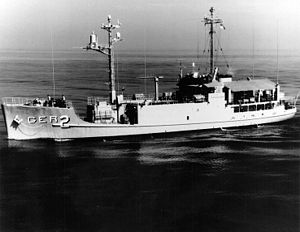
(USS Pueblo before capture. US Navy photo.)
“OK,” I said, “Pueblo was boarded and captured by DPRK naval personnel on January 23, 1968, less than a week after President Johnson’s Sate of the Union and weeks before the Tet Offensive commenced in South Vietnam. The whole of Asia was in an uproar.”
“You get right to it,” said Jake. “Why don’t you let the Admiral get adjusted to your barrage. And why don’t you meet Lauren.” The pert blonde behind the bar extended a hand in greeting.
“Hello,” I said, “We are the usual suspects.”
“So I can expect to be seeing you again?”
“It verges on the inevitable,” said Mac. She smiled and turned to place napkins and a wine menu in front of a sleek couple who had just sat down at the bar. Mac turned in his seat and raised a hand “Before we get to Pueblo, I wanted to tell you about something that happened while you were gone.”
“I am all ears,” I said.
“While you were in Michigan there was a story that made me think of you.”
“Really? What was it?”
“Ryan Williams on Channel 4 reported that there were 50,000 stray dogs in the Motor City, and a small group of men were picking them up and shipping them to any shelter that would take them in the country.”
“50,000? My God, I had no idea. I was just looking at abandoned buildings, not animals. Are they feral? Do they travel in packs, like the people?”
“Well, of course they span the spectrum. Some are starving, some are lost. They all need help, and the story was that these guys were providing it.”
“The depth of the sadness in that town is literally beyond belief,” I said. “Every aspect of it shows you something new and horrific about how a society can unravel.”
“Well, Ryan just told the story, but it resonated with the audience here. Tens of thousands in donations poured into the city to help out.”
“It is good to know that people still care,” Jake said, sipping his iced tea. “But I bet they just took the money, got in their van and left for Canada.”
Elisabeth was bustling up and down the bar, and finally gave up and brought a silver pitcher of tea sweating in the humidity and wrapped in a white napkin so she would not have to race back to keep jake’s glass filled. She topped up my happy hour white. This version was a crisp dry vintage with a hint of Pinot Grigio.
“I am going to stay focused here,” I declared. “I am not going to get off track like I did last time.”
“Really?” said Mac. “So you don’t want to hear about the Stuart Ford Building in Northwest? You were interested in the original Document Exploitation Center and the first National Photographic Interpretation Center after World War Two. You were interested in that before.”
“That would have been before they moved to Building 213 on the Navy Yard in Southwest,” said Jake. “Remember walking past it from the baseball game two weeks ago? That was the most secret building in the whole government for a quarter century- that is where the satellite imagery came when it was still two-man control of the pictures and tightly controlled.”
I could feel it slipping away from me. “OK, so the Pueblo damage assessment was conducted at the Naval Security Group headquarters, right? That was sort of like coming home for you.”
Mac smiled. “Building 3801 in the Nebraska Avenue complex where DHS is headquartered now,” he said. “But I remember at the Stuart Ford Dealership, everyone had a parking place inside. It was the only place in Washington where something like that existed. It had been a huge dealership before the war, and there were three levels of parking inside.”
“That’s right. Did you know that Black Jack Bartholomew worked there? He was a photo interpretation officer early in his career. I was the junior Detailer when he was the senior assignments officer,” said Jake. “What a guy.”
I gave up for the moment, because it was more important to discover that dark-haired Aimee had a pretty interesting life. We went back and forth on how she spelled her name, and what the ink said on her left forearm just below the roll of her black uniform sleeve.
“He invited me into his world,” she said, “And I told him I had my own.”
“That sounds like the saying that women need men like fish need bicycles,” I said.
She smiled winsomely. “That is what my mother used to say. She was a hippy.”
As it turns out, and I am not quite sure how, Aimee favors the Avon Foundation for the comprehensive approach it takes in supporting women with breast cancer.
“I am a survivor,” she said.
“I do the Susan Komen walk,” I said. “Is Avon better?”
Aimee pursed her lips. “I think so. They are much better in supporting the poor and the disadvantaged. I was lucky. I was diagnosed early, and since Mom was adopted and my Dad’s mother had a history, so I went ahead and had a dual mastectomy.”
“My God,” I said, thinking about the decision. “That is courageous.”
“No, the girls had to go. But that is not courageous for a middle-class white woman with decent health care. Courage is what you need when you get sick and you are poor. That is why I like Avon.”
“I will support both in the future,” I said.
“Don’t forget about the Alzheimer’s walk,” said Mac.
“I want to talk about that, too,” I said as Aimee walked away toward the cash register. “You lived with it for twenty years. I don’t think Raven is going to last five.”
“You never can tell,” said Mac. “Sometimes these thing go on for a long time.”
We talked about that for quite a while, since it is a topic near to my heart these days.
Eventually Jake had to go, and Mac decided to have dinner back at the Madison across the street where he lives. We got organized, said goodbye to Old Jim and Jon-with-no-H and short-haired Mike.
In the process we did manage to talk about Pueblo, the only ship of the US Navy being held hostage, and the mini-skirts that Wanda wore when she was typing the damage assessment report, but I will have to tell you about that later.
I have to be in Maryland.
Copyright 2011 Vic Socotra
www.vicsocotra.com
Cat Scratch Fever

“I am already done celebrating the death of bin Laden. I am much more excited about how many other jihadist cockroaches we exterminate before the sun goes down tomorrow.”
– Ted Nugent, Detroit rock ‘n’ roll, sporting and political activist icon.
There is a movie out that I have not ordered from Netflix yet- I still have two films from early Spring that are accusing me from next to the big screen television that has not been activated since last month. It is a sci-fi thriller called “Source Code” starring Jake Gyllenhaal and it got pretty good reviews.
In the film, Jake’s character wakes with a jolt to find himself on a commuter train heading into Chicago, home town of our President and the hapless Cubs. Although the other passengers all seem to know him, Jake has absolutely no idea of who or where he is. Before he can do anything, a train hurtles by on the opposing track and detonates, killing everyone.
Well, there is more to it, of course. It turns out that he’s a military helicopter pilot and part of Operation “Beleaguered Castle,” a time-loop computer program that enables him to live out the last minutes before the bombing over and over until he can figure out who is responsible and stop it. No buzz kill here- I don’t know if he does or not. And I don’t care that this plot gimmick was perfected in Ground Hog day.
I had to think about it this morning, because my pal Muhammed told me to get my head out of the morass of Detroit and pay attention to what is going on in the world around us. Consequently, you cannot blame me for thinking about train wrecks, helicopters, terrorists and the Motor City Madman, Ted Nugent.
It must have been the YouTube video of Ted doing Cat Scratch Fever with Baptist Minister and television personality Mike Huckabee that got me agitated before bed.
You don’t have to bear with me, and I would not blame you if you chose to put this down and just go to work. But it feels like Groundhog Day again. I mean, the national debt ceiling has been reached (again) and SecTreas Timmie Giethner says his only alternative is to start borrowing again all Federal pensions to keep the enterprise going.
That is the Timmie’s equivalent of going through the cushions on the government couch looking for loose change.
Apparently he can conduct more borrowing against what several of us spent our lives earning because he is obligated to pay it back, but the voracious debt will eat through that wiggle room in a matter of months. Think about it; we are going to burn through the total value of all the government pensions by August unless the idiots on the Hill find some compromise to borrow more money on the open market. Think about it.
It is Groundhog Day. Oh, did I mention that the War Powers Act stipulates that military action in Libya must cease today unless there is a specific resolution by Congress to let it continue? Figure the odds. Time was when the Dems went ballistic about the President making war without consulting them, but I guess where you sit is where you stand.
It fits with an increasing pattern of laws and customs that don’t seem to matter, unless you count the surprising arrest of the IMF Bank Chief, Dominique Strauss-Kahn for sexual assault. Apparently Europe is in an uproar about it, or at least my pal Kimo says so from Switzerland where he is vacationing. Monsieur Strauss-Khan is one of those Eurotrash bureaucrats who look down their noses at Americans, or at least when they are not forcing themselves into us.
Anyway, Muhammed and his lovely bride have just returned from the spring pilgrimage to the Black Hills, and like me, were out of touch when things went down in Abbottabad. They paid a visit to his parent’s house in Grabbingham over the weekend.
Coincidentally, his Dad shares a birthday with Raven, so we have a lot of issues in common. His father is still doing pretty well, but some things irritated him, starting with Fox News, which was playing in the background during the visit.
“Goes with the territory,” I said. “Fox was the only channel Raven and Magpie watched, but then Mom forgot how to operate the remote control and I changed the channel to TV-Land, which shows old and comfortable series like “Bonanza” and “I Dream of Jeannie.” It seemed to calm everyone down.”
“My Dad referred to President Obama as “That Arab,” he said indignantly. “When I commented on how great it was that the SEALs from Team SIX had killed bin Laden, my Mom gave him no credit.
Then she began ranting about how Obama is such a jerk, and that he revealed who shot Bin Laden, thus putting the wives of the SEALs at risk to terrorist retaliation.”
“You have to remember,” I said, “That it is customary in Washington for the non-participants to leak information to inflate their importance after a big success.”
“My son is telling me from his post overseas that Obama made amazing calls and decisions and was awesome in sifting through info and taking manly risks in authorizing the raid.”
“I can’t disagree with any of that. I read the manifesto that Ted Nugent wrote for the conservative rag here in town this morning. Killing bin Laden was the right thing to do, and the hell with the Pakis and the ISI. Kill all those cockroaches. I like the fact that they got his stash of porn. That hypocrite.”
“So, what is it, Vic? What is the real story?” I heard on TV that Bush dining on soufflé at the Rise restaurant in Dallas with Laura and a couple buddies. I thought “manly men” disdained anything French. Remember “freedom fries” after 9/11?”
“I do, and I don’t have any special insight into what went down,” I said. “I was in Canada when it happened, and I have had only two encounters in my active career with the special SEALS. It is perfectly evident that a Glide Bomb Unit two-thousand pounder would have been a lot easier to deliver to the upstairs bedroom, but this was a bold move, maybe the boldest ever. The President is right to take credit for it.”
“So that means that Fox and those whack-jobs on cable news are crazy, right?”
“Well, maybe. Like I said, I have no access to the E-ring at the Pentagon since they took away my building pass in March. But there is another version of what went down that shows how weird everything is.”
“What is that?”
“There is a story attributed to an unidentified insider that has Valerie Jarrett, the President’s senior Advisor on just about everything not knowing that Leon Panetta had already initiated a program that reported to him –and only him, involving a covert action against bin Laden’s compound.”
“Who is Jarret? What are you implying?”
“She is a piece of work. Low profile, but people say she is the equivalent of the President’s big sister who he brought along from Chicago. According to the nameless guy, there had been a push to invade the compound led by Leon Panetta at CIA, Hillary Clinton at State, Jim Clapper at DNI and Bob Gates and David Petraeus in DoD. Valerie’s opposition to military action enough to create uncertainty at the Oval Office.”
“Do you think that is credible?”
“I don’t know, but I looked into Ms Jarrett’s defense credentials and couldn’t find any. They say the President would meet with various components of the pro-invasion faction, almost always with Jarrett present. It was always a stalemate. Hillary was livid.”
“Well, there is a case to be made that military action could fail and harm the President’s already weakened standing on the economy and this could be viewed as an act of aggression against Muslims, and further destabilize Pakistan.”
“No doubt on that. Look at the fall-out. But I have to agree with Ted Nugent.”
“What changed the president’s position and enabled the attack against Osama Bin Laden to proceed?
“Nothing changed with the president’s opinion – he continued to avoid having one. They say Panetta authorized the raid on his own, and when Jarrett found out, she tried to stop it.”
“You are kidding, right?”
“That is the story. One of them, anyway. But remember, this is a town that manufactures hot air and bullshit. Why don’t we leave it like this: the operation went down with great courage and precision, killed a mass murderer and gained the equivalent of a library on how al Qaida did business.
“I honor the President for doing what he did,” said Muhammed. “It was even bigger than when he authorized the SEALs to take out the Somali pirates and rescue Captain Philips of the Maersk Alabama.”
“I am with you on that,” I said. “There is helmet cam video of the whole thing, and sooner or later it will come out. But we are never going to know the whole story on who did what to let the SEALs go in. There will be no tapes from the Oval Office, but it is pretty clear someone is going after Ms Jarrett.”
“That includes Fox News,” he said.
“True. My recommendation?” I said firmly. “Hide the remote control and change the channel to something more soothing. There is way too much going on.”
Copyright 2011 Vic Socotra
www.vicsocotra.com
Opportunities
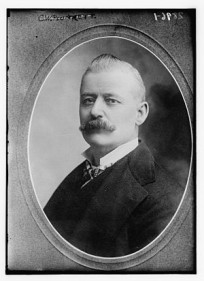
(George Washington Plunkitt, D-15 NY. “He seen his opportunities, and he took ‘em. Photo Wikipedia.)
I think things are OK with Raven, and thanks for asking. I got no further calls from the staff at Potemkin Village, anyway, and Sunday passed like the rainclouds and occasional thunder cells that rolled over the capital. In between storms, I got a decent walk when the sun unexpectedly broke through the bands of storm.
I caught up with Spike and Anook, reviewed our collective game-plan for the situation Up North. The key to it all is to keep Raven out of the hands of the medical people, and stay with the plan outlined by Doc B for his ultimate transition.
It is hard to get one’s mind around, though, and after doing a couple hours of paperwork, took a nap. I do my best thinking when I am unconscious.
The trip to Detroit and the visit with my parents was intensely emotional, and I need to put it in the mental settling pond to sort out. It is hard, really, to separate what has happened to the city and to them, but that is like confusing weather and climate. The latter is inevitable, like the aging process, and the former is entirely discretionary.
The decision to let Detroit go was quite intentional, and looking at the wealthy northwest suburbs, some people seem to be doing just fine. The fight of money and jobs from the city was a direct response to vast and pervasive corruption, high taxes, and virulent street crime. Of course there was a ugly racial component to the sad decline, but no one stayed to fight the systematic kleptocracy of Coleman Young’s long tenure in the Manoogian Mansion, the official residence of the Mayor of the Motor City.
There is a litany of woes on which people tag the precipitous decline: Racism, the riots, Big Labor featherbedding, and the ineptitude of the auto business to adapt to the new global landscape being the top four. But really, it was the decision of the tax base to cut and run because the alternative was to submit to confiscatory taxes imposed by a crony-based political system imposed by the Mayor.
Coleman Young got a free pass on the issue. He was never indicted for anything, and they have re-named the old City Airport for him, appropriate for a former Tuskegee Airman, and the municipal building where he held court.
Mayor Young was blunt-spoken about what he was doing and popular in the electorate that remained in the city. He adeptly used racism to seize and hold power, He made 8 Mile Road a symbolic barrier as significant as the Berlin Wall. What was good for Young was bad for the city, but Young made no effort to get any of the serious money that fled north of 8 Mile to return to the city through business investments.
In fact, the business model he followed was remarkably similar to that practiced by Reverend Jesse Jackson today- a sort of officially sanctioned extortion racket. He targeted the auto moguls and used organizations like Renaissance Detroit, founded by Henry Ford II, known locally as “the Deuce,” to coerce companies to return downtown where they were systematically fleeced by the city.
The auto companies, according to some commentators were paying a sort of “riot insurance” to avoid disruptions in the city, a card that Mayor Young adroitly played to continue his shake-down.
It is not fair to blame Mayor Young alone. After all, he only did what Big City mayors have done throughout history. “I seen my opportunities, and I took ‘em,” was the way George Washington Plunkitt phrased it about Boss Tweed’s Tammany Hall in New York.
Plunkitt was precise about the nature of the corruption of his era. He considered the difference between dishonest and honest graft: for dishonest graft “one worked solely for one’s own interests, while for honest graft one pursued the interests of one’s party, one’s state, and one’s personal interests all together.”
You can certainly see that Coleman Young could wrap himself in the guise of Honest Graft: shaking down the racists in the suburbs made the African American political base that much stronger in the city. The difference between New York, or Washington Dc in the case of Mayor-for-life Marion Barry.
The essential difference was that there was no way that New York would be abandoned, any more than the government would move out of the District. There was a reason to stay, and a reason to come back once there was the prospect of a reasonably rational government.
There is a lot of cool stuff in the wreckage of Detroit, but the name of one man who was a significant factor in the death of the city is not remembered the way Mayor Young is.
The judiciary helped things along. Activism from the bench is a curious thing. One of Raven and Magpie’s best friends out in Grabbingham was an attorney who was a mixture of Cary Grant and Benny Hill. Later appointed to the circuit court by Governor Milliken, Judge B’s favorite favorite litigation was representing minorities in housing discrimination cases.
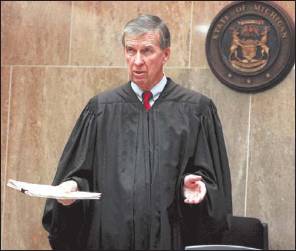
(Judge B. What a guy. He passed at age 78, ten years younger than Raven is now. Photo Oakland Press.)
Judge B took on Dr. Kevorkian, too, in three or four cases, and finally had to send him to jail when Dr. Death would not stop his mercy killings. Strange to think that the Hospice movement was the beneficiary of the pioneering “right to die” cases that Judge B tried to gently usher along.
Among his other memorable trials was the one in which a Jackson Prison inmate petitioned for the State to fund the removal of his penis and construction of a vagina to complete his sex change.
Judge B was a great guy. There was another judge on the District court named Stephen Roth who became one of the most reviled figures in America, and who like Judge B was trying to do the right thing in unsettled times.
Roth became infamous in the suburbs when a suit was brought before him by parents of Detroit Public School students and backed by the NAACP in 1970. I was in Ann Arbor then, no skin in that game, but it was fascinating to watch the impact on the city.
The essence of the complaint was that the rights of the students were being violated by a policy of racial segregation that violated the principles of Brown v. Board of Education, decided in 1954. Judge Roth agreed, and developed an integration plan that mandated 54 school districts in metropolitan Detroit begin busing 780,000 students into the city. Some of the kids would spend almost two hours a day on the bus.
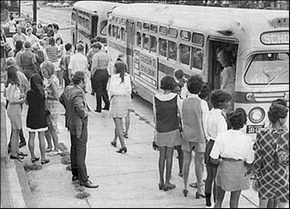
(Remember forced busing? It was huge, back in the day.)
The number of students affected is about the same as the total population of Detroit today. It was amazing at the time, and I think you can date a lot of the sentiment that went into the Reagan Revolution to the deep distrust of intrusive government.
The state of Michigan appealed the case all the way to U.S. Supreme Court, which reversed the ruling in 1974.
In their controversial 5-4 decision, the Supremes found that Roth’s remedy was unconstitutional, since there was no evidence the suburban districts deliberately engaged in segregation, and were denied due process since they did not have a chance to argue their position before Roth’s ruling.
Judge B would have agreed with him, I think, since he was convinced that the economic apartheid was just as efficient as de facto policy as one created de jure. It took another fifteen years for the matter to bounce back and forth
The ensuing legal battle took another 15 years and a second Supreme Court decision to resolve in favor of the suburbs, but by that time there was really no one left to save.
With Coleman Young doing everything in his power to encourage whites to leave, and with Roth’s decision forcing them to move to the outermost suburbs, it was certain that the metro Motor City was going to become as divided a society as South Africa before Nelson Mandella.
Dennis Archer followed Mayor Young, and he is a good man, but too much damage had been done. He left office with only a few reforms to the klepocracy. He was succeeded by the cartoon figure of Kwame Kilpatrick, son of Congresswoman Carolyn Cheeks Kilpatrick. It did not take long for his ineptitude and philandering to land himself in jail.
That takes us up to Mayor Dave Bing in the Detroit tragedy. The Mayor is a former all-star basketball player for the Pistons, and the city from whence I have just returned.
I am going to put the Motor City aside for now, and leave it where it sits: decaying, but still with some glitter left that provides some grim fascination.
You will be hearing more about it, though, since it is never really far from my mind, and until we get Raven and Magpie wherever it is that they are going, I will be back.
Copyright Vic Socotra 2011
www.vicsocotra.com
The Frost Diner
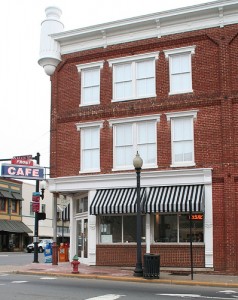
(The little diner on the corner in Culpeper. Photo Loretta Prencipe.)
I was having breakfast for a late lunch at The Frost Diner in downtown Culpeper. It was a gray day, misting a bit, though not enough to run the wipers on the Hubrismobile on the way down Rt 29.
I had met with the Yard Guy who supplements his income from the Gas Company by knocking down the invasive flora on the little farm, and apparently has some excess capacity, since he has offered to throw himself into the actual landscaping of the property.
I am OK with that, since this season I have a bit more money than time (I am confident that will be reversed soon enough) but he wanted my personal OK on what he is up to, and Heckle the Cat was out of food and there was every reason to be down there and every reason to realize there was no food in the house and why not the guilty pleasure of a stool at the diner.
Frost is all about guilty pleasures. It fronts the intersection of Main, which is Business Rt. 29, and East Davis. The Amtrak station is just down a couple blocks and it is sort of bewildering that this little town is one of the few where the trains stop and pick up people, and from here you could get just about anywhere there is passenger service, if there was world enough and time.
It was long past prime lunchtime, but the place was full, with only two booths available. The people were all locals, with a country sort of flare, and big the way Americans are these days. I opted for one of the 21 stools at the long counter where I could watch the lady doing the cooking.
According to local lore, the diner opened in 1928, a wholesome Roaring Twenties answer to the prohibited saloon culture. I don’t know if you could get a belt from the Pharmacist or not. All the folks that would have known where to get a drink in the County are long gone.
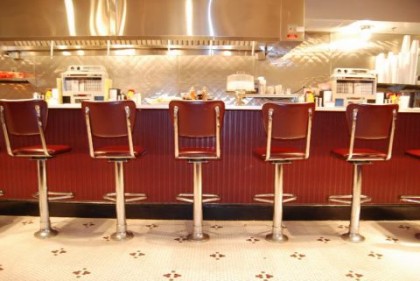
(The counter at the Frost Diner, directly in front of the griddle. Photo Philip Lambert.)
Then, it was known as the Gayheart Drug Store, and featured a soda fountain and a lunch counter. The outside neon sign, the interior pressed metal ceiling and the classic ceramic tile floor is in good shape, and behind the counter is a wall of diamond-patterned stainless steel. The soda fountain, the grill and the hood are also stainless, as are the metal mixer cups for the milkshakes.
The menu claims that Frost uses Monticello Dairy ice cream to make their milkshakes, which connects them vaguely to President Jefferson’s dairy cattle, but what won my heart was the fact that they serve breakfast 24 x 7.
Anyway, I had nothing but time and surveyed the menu. The footer boasted that: “Quality is remembered long after the price is forgotten.”
True enough, I thought, but the place was dirt cheap compared to Arlington, and I ordered a sweet tea to start and glanced through the options.
The sandwiches start with bologna on white bread, at $2.75, and go through about everything else you can think of, and there are the plate specials with plenty of potatoes.
I had a hankering for breakfast, and ordered a three-egg ham-and-cheese omelet with a side of corned beef hash.
I sipped the tea and ran through what was on the Crackberry as I watched my check advance across the clip-rack above the fry-cooks head. The staff is all female and wickedly efficient.
The omelet, hash and English muffin dripping with Monticello melted butter arrived just as the phone went off in my pocket.
The name on the caller ID was that of the admin specialist at Potemkin Village and my heart sank.
I answered, and discovered that think were not going that well Up North. I am supposed to be the medical advocate for both my parents, and that is something I try to avoid thinking about whenever possible. I am particularly leery of the term “advocate,” but their Doc and I seem to be on the same sheet of music.
“Your Dad fell again in the dining room,” said the lady on the phone. “We took his vitals and his heart and respiration are in the normal range, but we don’t know if he has injured himself, since he can’t communicate.”
“Is he comfortable?” I asked, looking down at the yellow omelet scattered with blue-gray specs of country ham.
“We are not sure. You might want to have him checked out.”
I started to think what that was gong to entail. Ambulance, then the Emergency Room at the regional hospital, then someone to pick him up and get him back to the Village when they what they might do to him in the interest of saving his life.
I thanked the lady and told her I would get with my brother and sister and see what they thought. Anook will be there shortly, though it will be four days.
I called the Village and Mom wouldn’t pick up the phone, and there was no response from Alaska or Arizona to walk through things. The omelet was cold by the time I got to it.
I had left enough messages that something happened after I gave up and went to bed. My sister did get through to the staff, on Alaska time, long after I had gone to bed.
She left me a voice mail saying that he had been able to walk down to dinner on his own, so I guess we will let this one slide.
Crap.
Copyright 2011 Vic Socotra
www.vicsocotra.com
Pool Season

The Pool at Big Pink is going to open in precisely two weeks, and it is time to get serious. Actually, Mary Margaret got me serious while I was still in the Little Village by the Bay, texting me that the cover was off the pool and the porter staff was power-washing the deck.
Jiggs got me serious when he called to tell me that the new earnest idiot on the Covenants Committee was making another run at the designated smoking area on the pool deck. I sighed. There could be all manner of mischief, and the delay caused by the flight cancellation, enhanced security and jihadi jitters made getting to the special meeting problematic.
I was on the ground in Washington is sufficient time to don a crisp aloha shirt and slacks to appear businesslike for the meeting, though, and had a cigar on Jigg’s porch before we went up to appear for the open comment period at the beginning of the meeting. That is the only time that the residents are permitted to speak. The rest of the meeting we are expected to sit quietly and not bother the grown-ups.
The Board had a quorum, which consisted of President Bruce, the Mad Latvian, Peggy from the Management Company, the Treasurer, and the Doc’s husband who is serving out the term of that Weasel who instituted the smoking ban last year and then fled the building.
There were only the three of us civilians there. One was a woman I had not met before, newly arrived to the building, and interested in getting involved with things. She was bright and perky and I immediately distrusted her.
Jiggs and I made the one-two punch after President Bruce called us to order. We stood, respectfully, and announced our names, status as owners, and unit numbers.
I made my little pitch, the one about Rodney King and why couldn’t we all just get along that I would start a petition again, just like last year, not in order to force people to breath second-hand smoke, but rather that the intrusion of the Nanny State was offensive and broke a tradition of individual liberty on the pool deck nearly a half century old.
Jiggs followed on with an argument about unintended consequences, and the butts that were going to pile up at the intersection of the walkways outside the pool gate if the smokers were forced to leave the pool deck and congregated by Tony’s place on the first floor, and how it was a mess and better controlled right where it was.
“Besides,” he said. “They are all dying off anyway.”
President Bruce took the matter under consideration and the Mad Latvian offered a motion that include no food, no diving and preservation of the designated smoking area. “There is no diving board anymore, so it just makes sense,” he said.
The Board voted solemnly and the Rules were amended unanimously. Jiggs and I stood, being single issue advocates, and went back downstairs to have a cocktail in celebration.
According to a well places source, apparently the popinjay from the EPA and the Covenants Committee showed up a half hour late, and there would have been a battle royal, but he was informed that the open session had passed, the motion had been carried and he was shit-out-of luck.
Battle over for this season, and with the economy about to tank, who knows if I will be here to fight the battle again for the summer of 2012, you know?
Democracy is good, sometimes, if you have the deck stacked right.
Copyright 2011 Vic Socotra
www.vicsocotra.com
God is Great

(Passengers, top right, subdue a man identified as Rageh Almurisi (not seen, since he is getting his ass kicked by the traveling public) on board an American Airlines flight headed to San Francisco on Sunday, in a photo shot by another passenger. Photo Andrew Wai via AP.)
There are thousands of people aloft this morning, headed all sorts of places. I am just back on the ground, personally, and contemplating traveling light for the next lift-off next week.
A pal has a kid somewhere around Flight Level 33, headed for Iceland, and my pal Dee is getting ready to launch for Sweden to attend a family function. At any given moment, we all have someone we care about up there someplace in the heavens, nearer my God to thee.
If you do the math, it actually turns out that given around 22,000 commercial jets in the inventory, and with a load factor of only 75% occupancy and a 30% utilization rate, you could have as many as 700,000 people in the air all the time. It is a curious thought, don’t you think?
I mean, that is the equivalent of almost seven sold-out Michigan Stadiums hurtling around the planet. I take a certain comfort in the odds that most flights are thoroughly routine and mostly boring.
Not always, though. I was musing on that while standing in the security line at DTW the other day. I told you about the hassle of trading airlines to accommodate a cancelled flight, and won’t belabor the point that standing in ine to be poked and prodded is a general indignity. You know that already.
The point is that it doesn’t work. Not with the airlines, and not with deranged Majors with semi-automatic pistols, not with any of the successful or nearly successful terror attacks. Every is a little hinky since the bin Laden execution, with good reason, but here is something that happened the day before I went flying the last time.
It was not covered in the alleged Mainstream Media, which appears to be paralyzed by some sort of bizarre political correctness, but rather by a local San Francisco television station.
It was on American Airline flight 1561, and you can look up the story for yourself, if you wish, but here is the story, which is about a Yemeni man shrieking “Allahu Akbar!” at the top of his lungs more than 30 times as he rushed the cockpit door, impacting it hard, twice. Here is the lead from the AP story that failed to make the Times this morning, or any other morning, for that matter:
“SAN FRANCISCO — The passengers sat stunned as they watched a man walk quickly toward the front of American Airlines Flight 1561 as it was descending toward San Francisco. He was screaming and then began pounding on the cockpit door.
“I kept saying to myself: ‘What’s he doing? Does he have a bomb? Is he armed?”‘ passenger Angelina Marty said.”
We have all been there these days, one of the first things to do after stuffing the sport coat in the overhead bin to properly wrinkle, is figure out who is sitting around you and what you might have to do to beat the crap out of them if they start acting weird. I mean, no one has stopped a hijacking, or tried to, except the passengers, and you have to be ready.
As it happened, the Boeing 737 landed safely, and Mr. Almurisi was charged (on the ground with “interfering with a flight crew,” which gratifyingly is still a federal offense. During the scuffle, Mr. Almurisi sustained some bruises and was checked at a hospital before being transported to San Mateo County Jail, according to a spokesman for airport police, who profess mystification at the motive for the incident.
Could he have wanted more pretzels?
If you will permit me the minor blasphemy, “Jesus Christ, WTF?”
Can TSA get it’s head out of it’s collective butt? We know exactly who the threat is.
God is great, my ass.
Copyright 2011 Vic Socotra
www.vicsocotra
You Can’t Go Home

(688 Chester Street, Grabbingham, Michigan. Photo Socotra.)
Thanks for suffering through the whole Detroit thing with me. I was riding on a bus yesterday, not knowing precisely what indignity I was going to suffer at the hands of the national air transportation system, but knowing, as you do, that something awful was in store under the clear skies, maybe not as bad as what Kayoed the poor old Motor City, but something unpleasant.
I stayed with friends the night before the flight down south; I felt guilty about leaving Magpie and Raven, and had booked an early afternoon flight to enable me to drive down the morning of the flight and get home in the afternoon. The luxury of already being there gave me a chance to kill some time with a trip to Grabbingham before proceeding to the airport.
I flogged the SUV toward Detroit, but veered north to what had been a comfortable bourgeoisie burg in my youth, a logical place for Detroit families to flee against the surge of block-busting realtors and developers determined to re-make the ethnic makeup of the fourth-largest city in America.
I wanted to see the two houses where we lived between 1956 and 1968. I wondered if they would be smaller or larger than I remembered.
On the placid lane off Maple Street, I watched in wonder as workmen added on to the 14,000 square foot mansion next to what I will always think of as The New Place, which essentially has been doubled in size by virtue of a massive addition to the rear facing the river and the park. It is not the only palace being augmented on Hawthorne Street; driving around, heading up town, I was surprised to see that my boyhood home was essentially untouched; everything else has been upgraded or transformed.
The Hill Building, Grabbingham’s original school, and the old High School were long gone. , as was Olsen’s Market at the corner of Bates and Chester. I remembered Merritt Olsen and his brothers would play bluegrass music there from banjoes that hung on the wall. Gone.
The little house at 688 Chester Street has lost the white fence that once surrounded it, but otherwise is unchanged. It cost $18,000 when Raven bought it, but got too small for our lifestyle.
If you contrast that with the Fabulous Ruins of Detroit images I captured of my birth city last week, it just makes everything surreal. I drove out of town again, headed for Telegraph and the airport with an air of unreality. There is plenty of money around, apparently. It just is not anyplace south of 8 Mile where the blight begins immediately, the gap-windowed buildings tumbling down. The emptiness was staggering, everything for sale or just falling apart.
It was a nice day to try to go home. The skies were blue and the temperature- well, temperate.
The last few trips in the sky had the ominous bumps and thumps of the seasonal weather change. I don’t like it, packed in the back, and view the ability to see what is happening on the instrument panel and out the canopy as being almost as necessary as an ejection seat. That is the ultimate in personal choice; making it optional to stay aboard and deal with some mechanic’s mistake, or tiny metal fractures in the structural members or bird-strike compounded by a boneheaded pilot error.
The sky was dangerously calm, which of course meant that my flight was cancelled. Naturally, they had lied throughout the process of getting the boarding pass and checking the bag that was heavy with clothing suited to the wrong climate and a bundle of frozen home-made smoked kielbasa from the Tannery Creek Market.
A tuxedo of antique and flamboyant cut was in a hanging bag, my briefcase stuffed with papers from someone else’s life, kindle, camera, charging cords, notebooks, literature from the conference.
An old man- a documentary film-maker, as it turned out, was the only other passenger on the Hertz Bus as we traveled to the North Terminal to meet our destiny.
“You don’t travel light,” he said, watching as I struggled with the ungainly aggregation of luggage with which I had become associated.
“Not my intent,” I said, with a trace of wounded indignation. “I did not have a lot of choices on this trip.” That was not nearly the level of irritation I experienced after the flight cancellation and transfer to another airline, which required a trip to baggage claim outside the security perimeter and another terminal and the necessity to stand in not one but three new lines after securing an alternate flight. The mounting anxiety level was directly coupled with the diminishing time to board the replacement flight.
Thankfully, the new inefficiency in the system permitted me sufficient time to be the very last person onto the aircraft and shoe-horn myself into a middle seat between two elderly Chinese women.
We taxied for about a half hour, touring the DTW flight campus. The pilot apologetically made an announcement that FAA controllers wanted more separation between traffic going into DCA, and hence we would be delayed at the hold-short before being permitted to proceed to the active runway.
When we started the approach to Reagan National, we were vectored all over the metro area, making wide sweeping turns calculated to open up distance between our flight and the one in front. Eventually we settled on the path of the Potomac for noise abatement and plopped down on the short runway in front of the glittering new terminal.
When we were on the ground, and the stress began to leak out of my body, I thanked the Captain for the tour of Northern Virginia and the nice landing.
Walking out of the jetway, wondering if my bag and the kielbasa had made it to Washington, I saw that the terminal was jammed with people looking covetously at the path to the sky. They were obviously stressed and delayed. Passing out through the security portal, I saw that the line of people waiting to be x-rayed stretched back from the beginning of the cattle chute nearly to the other concourse. It would take them as long to get processed as the smoked kielbasa.
“Michele Obama, and her too-close encounter with the Air Force Tanker at Andrews two weeks ago,” I said to no one in particular. “And that asshole Osama bin Laden.” I was pleasantly surprised to be re-united with my sausage, and even more surprised to be back, eventually, under those beaming skies at Big Pink only a few hours later than I had expected.
Maybe you can go home, if you don’t stay away too long.
Copyright 2011 Vic Socotra
www.vicsocotra.com
Colonel Biff’s Veggie Soup

Gentle Readers,
It is time to leave the Wolverine State behind for now. Raven and Magpie will get by for the next few days, I am confident, and my intrepid sister Anook of the North will arrive shortly to minister to their needs and give Magpie a break from the constant wear of her partner of 64 summers.
I will be back in the hurly-burly of the nation’s capital once more later today, and will put aside the extraordinary narrative of a once-great city that may be showing signs of revival, and the cruel ravages of an insidious disease for which there is no respite and no cure.
It being a travel day, I will make a last nod to the city on the Detroit River whose Red Wings have clawed back from a three game deficit to the San Jose Sharks in the hunt for Lord Stanley’s Cup, and pray that they can hang on for another victory and advance.
The city can use all the help it can get.
With that, I give you a chapter from the forthcoming block-buster compilation of recipes provided by real-life Spooks: The Cloak and Dagger Cook Book. All the dishes have been personally vetted by real intelligence professionals for quality and goodness.
Standing in today for Vic’s usual rant is Colonel Biff, a much-respected colleague from Pentagon days, who has gone on to build a useful life quite apart from matters of national security. Enjoy the soup- I did. More tomorrow from Washington.
Hi, Vic–
My sister, Miki, made a fabulous vegetable soup recently, which I have tailored a bit. It’s really a good recipe, so hope you enjoy it–you can use whatever veggies you like.
This picture shows all of the prep work completed and I’m getting ready to sauté the veggies and add liquid. I make a huge batch that lasts almost a week for Bill and me.
Here are the veggies I have used so far:
– onions (1 big one, I’ve used sweet onions and purple onions so far, and may go to having two onions per batch)
– fresh minced garlic (about 10 cloves, just make sure that you don’t put the garlic directly on the hot pan as the odor will carry for awhile)
– carrots (you’ll see from the picture of the orange bowl, I use a fair amount)
– celery (to include the celery leaves–I chopped up one bunch)
– red, orange, and yellow peppers
– fresh green beans (I chop off the tips and then cut them into about 3/4″ pieces–a fair amount, as shown in the photo)
– leeks (chop bottoms and most of green off, slice lengthwise and rinse, then cut as you would a scallion/green onion)
– zucchini (not shown in the picture as I didn’t use it this batch, but in a prior batch, have cut one large zucc into small pieces)
– mushrooms (I bought one of the 8 oz. packages and chopped them into small pieces)
– fresh baby spinach (big plastic carton full, chopped into
– kale (one bunch, discarding the hard stems, then cutting the leaves into smaller pieces)
– collard greens (not in this batch, but used previously, chopped into smaller pieces).
You can add all kinds of other veggies–this is truly a “catch all” recipe!
Directions:
Using a small amount of olive oil, I sauté the veggies, pretty much in the order shown, adding one at a time. Total sauté time is about 8-10 minutes.
Also, I add small amounts of hot water to the mix as needed to keep things from burning. When I first made this, I used a skillet pan, but quickly outgrew its capacity. I could probably still sauté everything in it and then transfer the mix to the big pot. Once all of the veggies are sautéed, I add quite a bit of water. I also add about 2-3 tablespoons of brewer’s nutritional yeast (yellow powder), which is vitamin B–healthy, healthy!
At this point, I take about 2 cups of roasted, salted cashews and put them in my blender. Add enough water to cover the cashews and then blend. Add that mixture to the soup. Let the soup heat (I keep the burner on high) for about 20 minutes, stirring as needed.
I’ve experimented with adding different mixtures of grains to help the soup “stick to your bones.” In this week’s batch, I added two packages of Seeds of Change microwavable quinoa and brown rice, plus one package of Seeds of Change microwavable seven grain mixture. I didn’t microwave them, just threw them in the pot. However, I think I would go with only two packages next time. I’ve cooked a mixture of grains separately and then added them to the soup mixture, also.
For the Omnivores: You can also add meat–I’ve added two 12.5 ounce cans of turkey breast or chicken breast in water — drain the water and shred or cut into smaller pieces all of the meat before adding it to the pot.
Salt and pepper to taste (I use McCormick’s Montreal Steak seasonings as well). I would love any suggestions for adding fresh herbs–that’s another area where I need educating!
Total time including preparation and cooking is about an hour. That pot is about 2/3 full by the time the soup is ready to serve!
We end up adding a bit of water to the bowls each time we heat the soup up as the mixture does thicken. You can puree the whole mix if you wish, but it’s really nice in the chunky mode, too.
Enjoy! Please give me feedback if you find some great adds/alterations.
Cheers,
Biff
Note: Many thanks to my sister, Miki, who would not approve of the meat add at all!!
Loose Ends
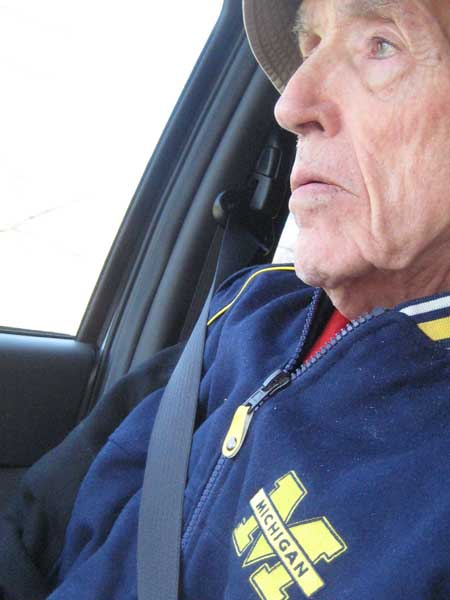
(Raven in his shotgun seat in the rental SUV. Photo Socotra.)
This was an interesting trip Up North, if you care for things that are “Interesting.” I don’t.
Some things got done, and for the first time in a long while I did not spend a day knocking my head against a wall screwing with some IT problems. I ignored them.
I got the trash and the boxes stacked up against the garage out by the curb. Some of the boxes went to the scavengers, others to the Waste Management Professionals with the mouse in the trap and the scary bag of shrimp from the refrigerator.
I wrote status updates for Anook on Magpie’s broken tooth, the x-rays from yesterday’s adventures in emergency dentistry, signed contracts for the kitchen and bath upgrades to get the place ready to rent or sell. There is a Flyer from the City on the counter referencing what we can put out to the curb and have collected, and what we are going to have to hump to the dump ourselves.
I got nothing else done except write the two big checks and get the pictures off the wall in the dining room and yank the remote cameras we tried to use to monitor the folks well-being last year before things fell off the cliff. I yanked the wires out of the fireplace and off the mantle in the living room and put them in a box to deal with in the library, where everything is migrating in preparation for plastering and painting.
Got nowhere near where I wanted to be. There are still boxes (empty, best I can tell) in the crawl space downstairs, even if all the junk is now in the garage. All of Raven’s office is still there and so are all the furnishings on the lower level.
Accomplishments included returning the “Poor Box” that presumably came from the Methodist Church next door that I found with the lock jimmied on the steps to the Big Top, which apparently needs a new roof. Crap.
Accomplishments did not include doing anything about the lawn, the huge pile of cigarette butts where the trash goes and which is apparently a designated off-the-hospital campus non-smoke free zone for the employees, or dealing with the rail fence’s missing rail or getting everything off the walls in the living room, Raven and Magpie’s former master bedroom, or the guest suite downstairs.
I am exhausted. I am sorry I could not get more done. But I am of the realization that Raven is not long for the planet.
The biggest loose end is the one that aches the worst, and has all the mystery in the world.
Copyright Vic Socotra 2011
www.vicsocotra.com
The Train Wreck
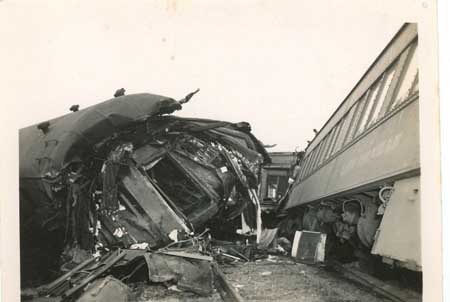
(Terra Haute, September 1944. Photo credits below.)
The trains came together and crashed with a sound.
That people could hear for miles around.
The fog was so heavy, the engineer could not see.
Nor would he ever know what the outcome would be.
Two cars held airmen who’d flown missions over Italy.
Some were killed, while others were hurt badly.
Three long hours the sirens did blow.
The worst of sounds a nurse could know.
In memory, that tragic morning shall remain evermore,
Thursday, September fourteenth, nineteen hundred forty four.
I thanked God I was a nurse on that fateful day
So I could help hold onto lives, that were slipping away.
— Mary Lou Taylor S/N
The Handicapped placard for the rear-view mirror is in Alaska, or Arizona, or someplace even less useful. I parked the car a long way away from the entrance to the Sidedoor Saloon. We stopped at the Tannery Creek Market across the parking lot- it used to be a Pizza Hut as you could tell from the distinctive roof-line, but it has assumed new life as high-end gourmet food emporium.
Dee got some cuts of Hamtramck-style smoked kielbasa that she was going to cook with sauerkraut and drive the neighbors crazy down at Torch Lake. Then we navigated Raven back to the rental car that was parked inconveniently far from any door we wanted to use.
“Let’s drive over to Harbor Springs,” I said brightly, hoping the pleasant day and sunny skies would provide some stimulation while not lasting long enough that Raven would be in extremis again. The whole incontinence thing is a little more than I can handle. The shaving is bade enough, but the Depends adventure is not something I deal with well.
Thank God the little village has a public rest room, and that it is maintained clean and tidy, though I am not going to launch into that story. If you have been through this you know, and if you don’t, hope that you won’t.
Anyway, I was intrigued by Dee story of her Father Ernie the bootlegger, speed-boat driver, and man of his times. Once we had Raven buckled into the Shotgun seat and Magpie happy in the back, I started the SUV and pulled out onto US-131 north to take the 117 route north around the head of the Bay, past the State Park and the Tosky-Sands party store that I have been visiting since I required fake ID to purchase beer.
“Do you remember any more of the story?” I asked.
“Oh my, no. I heard Daddy tell the stories, of course. I was too young. I was twelve when the war ended and the 21st Amendment ending Prohibition was passed in 1933, the year before I was born. But Mom and my sister and the other kids were there the night Ernie was arrested.”
“What was that like?” I said, trying to imagine the arrest of a solid family man.
“It was about two in the morning. Everyone was in bed. The FBI surrounded the house, and one of the agents came up and started to bang on the door, shouting for Daddy to come out.”
“That must have been quite an alarming situation,” I said, looking at the airport to my left as the road bent west toward the Springs. Raven was commenting on the ride. “Smooth,” he said. He enjoys the rides, even if they fill me with a little apprehension.
“It was. Mom and Dad’s bedroom looked out on the roof gable, and Daddy grabbed his gun and went out the window. Mom told him not to do that.”
“Oh, my God. He had a drawn gun and went out to confront a posse of FBI Agents?”
“Yes, but there were so many of them he put it down. We did not see him again for more than a year. He was convicted, put on that train to Leavenworth, and served his debt to society, a year and a day in the prison. My sisters saw him, though. They went to Kansas and saw him in the visiting room. He asked for a Ten Dollar bill, which was a lot of money in those days, and he folded it up so small that he was able to put it under his tongue to take back to the cells.”
“Amazing,’ I said.
“When he got out, Ernie said they gave him a train ticket to Detroit, a new suit, an a raor blade.”
“A razor blade?”
“Yeas, Daddy said he suits were so cheap that if you got caught out in the rain it was shrink so fast it would strangle you. The razor blade was to let you cut your way out of the suit before it killed you.”
“He sounds like a hell of a guy.”
“He was. He stopped at a speakeasy in Detroit on his way home. Momma heard from a friend that “Ernie was out of jail,” but she had not seen him yet.”
“Everything in its time,” I said. “I would certainly stop for a cocktail on the way home. Don’t blame him.”
“What is he doing now?” asked Magpie brightly from her side of the back seat.
“He passed in the 1970s,” said Dee, for the third time in the conversation. “That was a natural passing for a life with a lot of adventure. Not like my brother Bob.”
“He was the one killed in the war, right?” I asked.
“Well, that was the interesting thing about it. He had served in Italy with the Air Corps. He went in the Service right at the beginning of the war and completed his 50 missions in 1944. He as shot down twice. The second time he and his crew were in the water for twelve hours before the British rescued them.”
“Wow,” I said. “But he died back here?”
“Yes. I have his log book with all the missions written down. After the last one he wrote “Michigan, Here I Come!”
“So what happened?”
He left Detroit from the Michigan Central Terminal after some home-leave and was headed for a connection in Chicago to go down south for an assignment as an instructor pilot, training the new guys. He had made it all the way through combat, and was safe at home.”
“Then what?”
“Two Chicago and Eastern Illinois trains collided head-on at 25th Street and Haythorne Avenue in Terre Haute, Indiana. Apparently there was a dense fog. I have the clipping about it. It was a huge tragedy. Bob was killed right there. I found it on the internet the other day.”
“That is so ironic,” I said.
“Yes, there was a lot of confusion. My brother Ray was serving in the South Pacific in the Navy, and everyone thought that Ernie was confused when he was making the calls to the family. Ray was in combat, and Bob was home safe. So everyone thought it was Ray who was killed.”
We tooled around harbor Springs and looked at the famous Steel Octagon house, and the Bar Harbor at the corner across from the famous Pier Restaurant, and then headed north out of town past the neat little houses and almost all the way up to Pond Hill Farm. I cut over on East Middle road to get back to town, and rolled back to the Village.
Dee and I walked them back up to the apartment and we got the hats and coats put away, and we made our exit to get Dee back to her car.
“I will be back for Happy Hour,” I said, as Raven plunked down on the couch to doze.
After Dee drove south, I checked the internet to see what I could find about the accident.
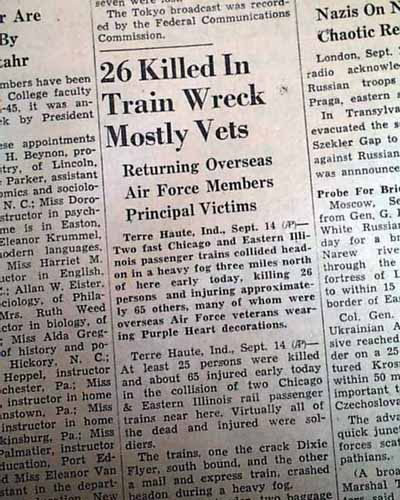
According to news accounts from September of 1944, a 15-car mail train heading north stopped at the signal about 2:18 a.m. But two minutes later it was struck by a 14-car passenger train traveling about 35 mph.
Investigators concluded hat in the fog the passenger train failed to enter a siding as instructed.
Many of the passengers aboard the second train were servicemen of the U.S. Army Air Force, heading to Miami from Chicago after a tour of duty on the Italian front of World War II.
As the wreckage was cleared, 29 were dead, 42 were injured, and Union Hospital was swamped. A nurse named Mary Lou Taylor wrote a poem about it, which is what leads you into this story. It was a damned shame.
Fifty missions complete, shot down twice, and survive it all. Then to die in Terre Haute, a month before your 21st birthday. Life is sure a crap-shoot, isn’t it?
Then I drove back over to the Village to have drinks with the folks before dinner. For Raven, a glass of ice-milk. For Magpie a glass of Box Blush wine. And for me, a tall tumbler of vodka, which I consider the second-to-last-stop on the Oblivion Express.
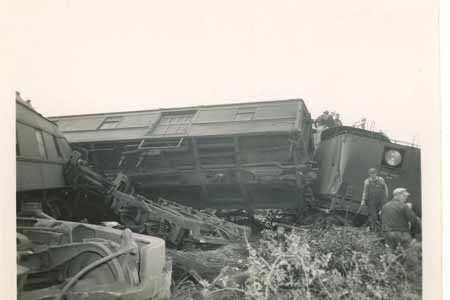
(Workers inspect the wreckage. Photos from the private collection of Betty Alcorn. Digital image copyright 2007 Indiana State University Library. Transferred via Powerpoint capture to jpeg format by Socotra 2011.)
Copyright 2011 Vic Socotra
www.vicsocotra.com
